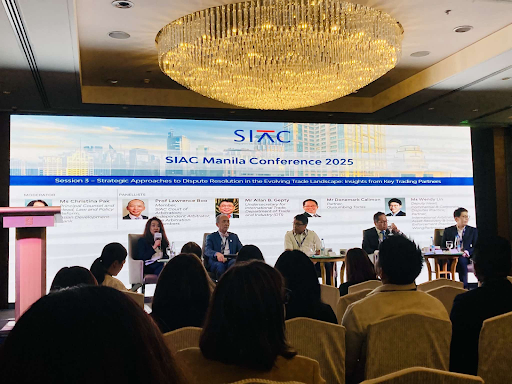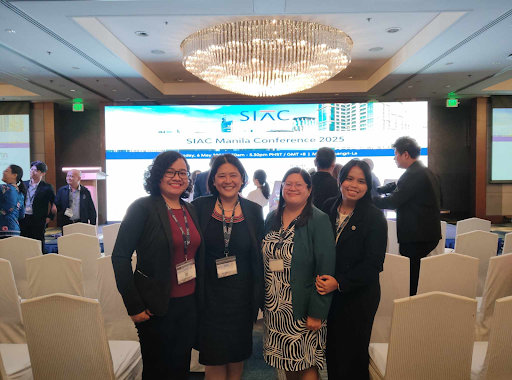On May 6, 2025, key personnel from the Legal Affairs Service (LAS) of the Cooperative Development Authority (CDA) joined nearly 300 arbitrators and alternative dispute resolution (ADR) practitioners at the Singapore International Arbitration Centre (SIAC) Manila Conference 2025, held in the Isabela Ballroom of Makati Shangri-La Hotel, Makati City. Government leaders, in-house counsel, and private practitioners convened to discuss the newly updated SIAC Rules 2025 (2025 Rules), which took effect on January 1.
Faster, Fairer, Cost-Effective Arbitration
The conference opened with addresses outlining the 2025 Rules’ core objectives—accelerating case timelines, enhancing procedural fairness, and reducing costs. In her keynote, SIAC CEO Gloria Lim underscored the Rules’ streamlined timetable for document production and consolidated hearing slots. Atty. Margaret Raizza D. Andaman, Executive Director V of the Office for Alternative Dispute Resolution (OADR), echoed this emphasis on efficiency balanced by trust, stating, “Let’s keep learning, keep building, and keep showing the world that justice may not always be grand, but it must always be genuine.” Additionally, she emphasized the importance of striking a balance between trustworthiness and efficiency in the administration of justice, saying that “Yes, justice must be swift, but above all, it must be trusted.”
Following their inspiring messages, the 2025 Rules were further discussed by a panel moderated by SIAC Registrar Vivekananda Neelakanta, which included distinguished officers and counsels from GCash, Sy & Partners, and Lindsay Francis & Mangan Pte. Ltd as panelists.
Enforcement Best Practices
The next panel on enforcement dissected how national courts uphold arbitral awards, positioning Singapore as the regional benchmark. Speakers shared practical steps for enforcing awards against reluctant respondents. The CDA delegates evaluated these insights for potential adaptation to the CDA rules and regulations in resolving inter- and intra-cooperative disputes.
ADR’s Role in Trade Stability
The final panel focused on Alternative Dispute Resolution in international trade agreements. Panelists highlighted ADR’s capacity to resolve investor-state disputes without resorting to protracted litigation, thereby preserving diplomatic and commercial ties. Discussions covered case studies in the manufacturing and energy sectors, illustrating how mediation and expedited arbitration clauses can avert full-scale treaty disputes.
CDA Delegation Looks Ahead
The CDA delegation was headed by Deputy Administrator Atty. Leah B. Banagui-Han, who was joined by the Legal Division Chief Atty. Sheena T. Rima, Legal Assistant III Phoebe Rose D. Tolete, and Administrative Assistant III Kristine May G. Celispara. Throughout the day, they engaged with peers from other national government agencies and private firms, both local and international. Notably, they spotlighted the CDA’s nascent ADR Center program and, at a networking luncheon, invited fellow delegates to join the CDA’s arbitration initiative by promoting awareness of the accreditation requirements for CDA voluntary arbitrators. Securing interest from ADR practitioners is essential to expanding the CDA’s roster of certified neutrals.
By attending the SIAC Manila Conference 2025, the LAS reaffirmed its commitment to strengthening and elevating the CDA’s arbitration framework. Armed with conference insights, the LAS will aim to review the CDA rules on arbitration to ensure genuine, swift, and trusted dispute resolution within the cooperative sector.








